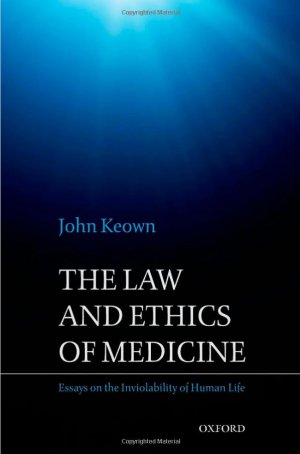Book Review
The Law And Ethics Of Medicine
Essays on the
Inviolability of Human Life
John Keown
Oxford University Press
ISBN
978-0-19-958955-5
 John
Keown holds the Rose F Kennedy Chair in the Kennedy Institute of
Ethics at Georgetown University. His research has been cited by
the United States Supreme court, the House of Lords Select
Committee on Medical Ethics and the Australian Senate. He has
also served as a member of the Ethics Committee of the British
Medical Association. In this work, he explains and defends the
principle of the sanctity or inviolability of life (IOL) and its
relevance to English law governing aspects of medical practice
at the beginning and end of life.
John
Keown holds the Rose F Kennedy Chair in the Kennedy Institute of
Ethics at Georgetown University. His research has been cited by
the United States Supreme court, the House of Lords Select
Committee on Medical Ethics and the Australian Senate. He has
also served as a member of the Ethics Committee of the British
Medical Association. In this work, he explains and defends the
principle of the sanctity or inviolability of life (IOL) and its
relevance to English law governing aspects of medical practice
at the beginning and end of life.
Chapter one shows that IOL requires to be distinguished from "vitalism" (preserving life at all cost) on the one hand and "quality of life" ethics on the other. It is also argued that the definition of "best interests" in the Mental Capacity Act is unsatisfactory as it is based on subjective opinion. It is also stated that the exercise of autonomy is not the fundamental source of worth in a person's life.
Chapter two examines the various errors of the legal scholar and utilitarian Glanville Williams. It is quite astounding to note that so many basic errors of theology were made by such an influential figure.
Chapter three evaluates Sir Ian Kennedy's understanding of the value of life. Kennedy makes exaggerated claims on the value of autonomy and thus builds on the shaky foundations of Glanville Williams. His misunderstanding of IOL is in part due to his conflation of intention and foresight.
Chapter four is an assessment of of the works of two academics, one of whom confuses IOL with vitalism and the other dismisses IOL as "religious" and "speciesist."
Chapter five is a critique of Roe v Wade, the ruling which established a right to abortion in the United States in 1973. The author argues that the ruling was a radical departure from the law's historical protection of the unborn child.
In chapter six the author questions the soundness of the judgement which states that the morning after pill does not procure a "miscarriage" contrary to the the Offences against the Person Act 1861. It is argued that the nineteenth century medico-legal texts make it clear that "miscarriage" was understood in 1861 to include the prevention of implantation.
Chapter seven is an evaluation of C v S, a case in which a man unsuccessfully sought an injunction to prevent his former girlfriend from aborting the child.
Chapter eight considers the legal status of the human embryo in vitro in Anglo-American law.
Chapter nine is on assisted suicide and euthanasia in the Netherlands and Oregon. It concludes with a discussion of the Joffe Bill.
Chapter ten looks again at the euthanasia debate in the light of recent cases including those of Dianne Pretty and Debbie Purdy.
Chapter eleven argues that almost 100,000 people suffer unnecessary pain because of unmet need for palliative care. There is an urgent ethical obligation to meet this need.
Chapter twelve is on the outcome of the Tony Bland case, involving a young man in a "persistent vegetative state" whose life support was withdrawn even though he was not dying.
This work is uniformly well written and,though scholarly, is very readable. Keown is undoubtedly one of the most powerful defenders of the inviolability of life principle.
REVIEWED BY DR PRAVIN THEVATHASAN
